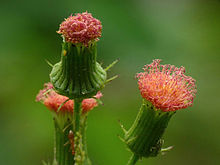| Crassocephalum crepidioides | |
|---|---|

| |
| Scientific classification | |
| Kingdom: | Plantae |
| Clade: | Tracheophytes |
| Clade: | Angiosperms |
| Clade: | Eudicots |
| Clade: | Asterids |
| Order: | Asterales |
| Family: | Asteraceae |
| Genus: | Crassocephalum |
| Species: | C. crepidioides |
| Binomial name | |
| Crassocephalum crepidioides (Benth.) S.Moore 1912 | |
| Synonyms | |
| |

Crassocephalum crepidioides, also called ebolo, thickhead, redflower ragleaf, or fireweed, is an erect annual slightly succulent herb growing up to 180 cm tall. Its use is widespread in many tropical and subtropical regions, but is especially prominent in tropical Africa. Its fleshy, mucilaginous leaves and stems are eaten as a vegetable, and many parts of the plant have medical uses. However, the safety of internal use needs further research due to the presence of plant toxins.
Ecology
The species is invasive in New Caledonia.
Toxicity
Crassocephalum crepidioides contains the hepatotoxic and tumorigenic pyrrolizidine alkaloid, jacobine. However, in another study, it is shown that the antitumor activity and macrophage nitric oxide produce action.
References
- The Plant List, Crassocephalum crepidioides (Benth.) S.Moore
- ^ Grubben, G.J.H., Vegetables, Volume 2 of Plant Resources of Tropical Africa, PROTA 2004, ISBN 90-5782-147-8
- Hequet, Vanessa (2009). LES ESPÈCES EXOTIQUES ENVAHISSANTES DE NOUVELLE-CALÉDONIE (PDF) (in French). p. 17.
- Fu, P.P., Yang, Y.C., Xia, Q., Chou, M.C., Cui, Y.Y., Lin G., "Pyrrolizidine alkaloids-tumorigenic components in Chinese herbal medicines and dietary supplements", Journal of Food and Drug Analysis, Vol. 10, No. 4, 2002, pp. 198-211
- Tomimori, Koh, et al. "Antitumor activity and macrophage nitric oxide producing action of medicinal herb, Crassocephalum crepidioides." BMC complementary and alternative medicine 12.1 (2012): 78.
![]() Media related to Crassocephalum crepidioides at Wikimedia Commons
Media related to Crassocephalum crepidioides at Wikimedia Commons
| Taxon identifiers | |
|---|---|
| Crassocephalum crepidioides |
|
| Gynura crepidioides | |
This vegetable-related article is a stub. You can help Misplaced Pages by expanding it. |
This Senecioneae-related article is a stub. You can help Misplaced Pages by expanding it. |